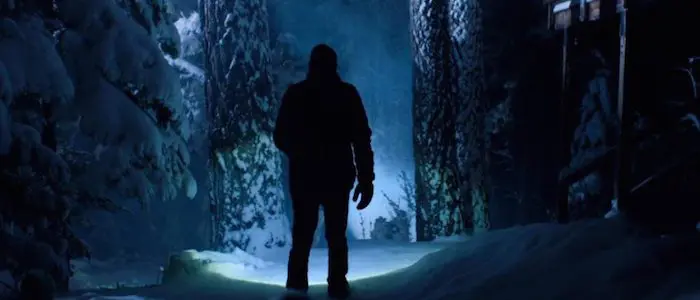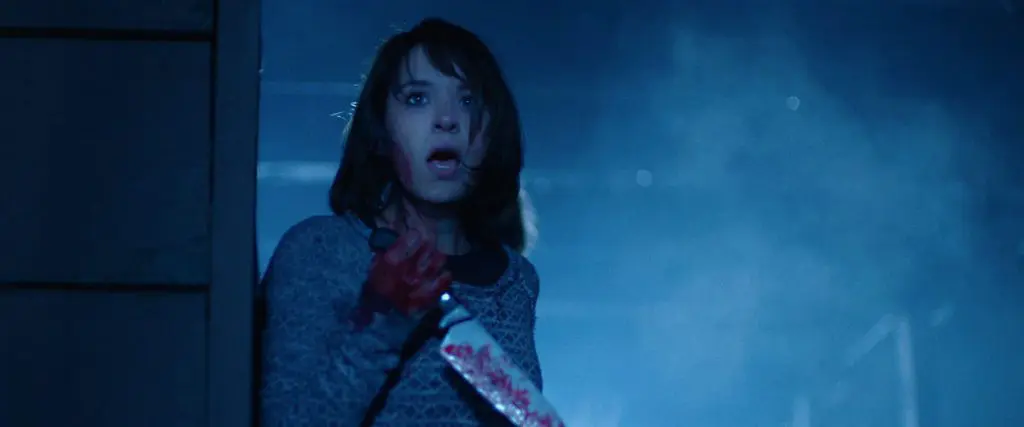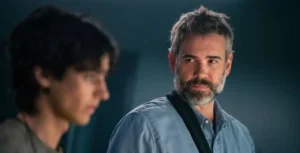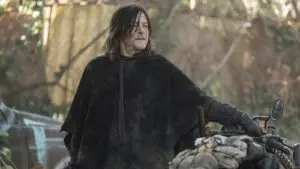Summary
Despite some enjoyably over-the-top practical effects and a solid leading performance, Dead Night eventually descends into needless confusion.
At this point, if you go anywhere near a cabin the woods, you’re just asking for trouble. Brad Baruh’s Dead Night – as generic a title as you can imagine – is a loving throwback to when dopey holidaymakers would venture out to a remote abode in the middle of nowhere, to bond or to relax or whatever, and end up getting messily offed by the local serial killer or demon or cannibal gas station attendant.
Dead Night is a firmly middle-of-the-pack bit of low-budget genre work with one hell of an opening, a committed leading performance, some sloshy old-school practical effects, and a decent idea or two. But it also bogs itself down with weirdness, eventually becoming confused and silly above all else.
You get the sense that the characters should know better. Husband and wife Casey and James Pollack (Brea Grant; AJ Bowen) take their teen children Jessica (Sophie Dalah) and Jason (Joshua Hoffman) and Jessica’s friend Becky (Elise Luthman) to a shack in the frosty wilderness, ostensibly to test out the miraculous healing properties of the rock deposits the house is built over. I’m not sure anyone really believes that staying there will fix James’s terminal cancer diagnosis, least of all me, but it swiftly becomes apparent that they’re all a lot closer to death than they first suspected.

You know the signs. The phones are out. There’s no Wi-Fi. A woman is unconscious in the snow outside – and she’s played by beloved 1980s scream queen Barbara Crampton. This is telling enough. It comes as no surprise that, rather than being thankful for her rescue, Babs immediately acts like a nutcase, telling weird jokes and asking uncomfortably personal questions. By the time the Pollacks decide to give her the boot, it’s too late. Shenanigans are afoot.
I won’t spoil. You probably wouldn’t believe me even if I did, as Dead Night is one of those horror movies that pile on absurdities and curveballs until what you’re left with scarcely resembles the setup. None feel particularly well justified or useful to the proceedings; it’s weirdness for the sake of it, and while initially it adds an eerie unpredictability, eventually it just comes across as daft. Baruh, who co-writes, has some semblance of visual style, but he doesn’t have the storytelling chops to tie all his wacky, disparate ideas into a cohesive, satisfying whole.
The most intriguing narrative conceit of Dead Night is how it interlaces what happens to Casey and her family with a dramatic retelling in the form of a true-crime show that, of course, barely resembles the actual events. But like any similar flash-forward storytelling device, rather than build anticipation or make a point, it mostly just works to bleed the tension from the story. Telling the tale in a straightforward manner probably wouldn’t have improved Dead Night too much, but at least it would have been clearer why it doesn’t work that well.




